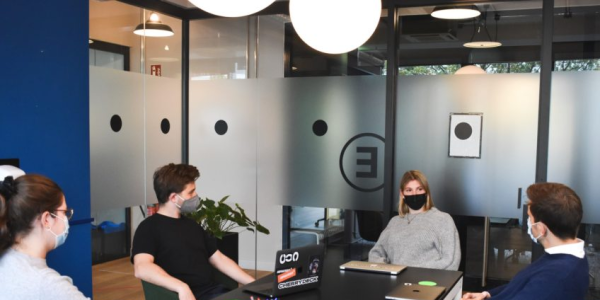Imagine this situation – Lata comes home late from work, too tired to do anything but change her clothes and eat dinner. She doesn’t have the energy to cook, so she orders dinner from a popular food aggregator app – something she has done many times. When the doorbell rings, it’s almost midnight, and she staggers to the door wearing a short T-shirt and shorts (her usual nightclothes). She has never seen the delivery guy (Vinay) standing in front of her, who is staring at her. She takes the food packet and turns around to pay for the food when Vinay makes a sexual advance. He asks her if he could come inside to share the food and the night with her. Horrified and scared, Lata quickly throws the money at him and slams the door in his face. This is a straightforward case of workplace Sexual Harassment – the question is, whose workplace is this and who should Lata complain to?
The Sexual Harassment of Women at Workplace (Prevention, Prohibition & Redressal) Act, 2013 (PoSH Act) includes the “unorganised sector" in its ambit. It defines it under Section 2 (p) of the PoSH Act as the workplace of an enterprise owned by individuals or self-employed workers and where employed workers are less than ten. Gig workers (working with aggregator apps), blue-collar workers (working in hotels and retail stores) and contractual workers (working at construction sites and in warehouses) are all a part of the unorganised sector. The PoSH Act applies to all organisations that hire such workers and mandates a robust PoSH policy and an Internal Committee (IC/ICC) to ensure workplace safety for women.
Further, Section 2 (o) of the PoSH Act provides an expanded definition of the “workplace”, which includes any place visited by the employee arising out of or during the course of employment. This is especially noteworthy in the case of gig workers working with aggregator apps. Places such as their taxis, where they make deliveries, and homes where they provide services all become “workplaces” since these are places an employee visits out of or during the course of employment. For any act of Sexual Harassment committed in such workplaces, the harasser is liable to be punished in terms of the PoSH Act, even if the aggrieved woman is not an employee of the same organisation. In the example above, since it was the “workplace” of Vinay, who was delivering the food at Lata’s house, Lata could have complained to the IC set up by Vinay’s employer, i.e. the food aggregator app.
With the increasing use of delivery, online service and aggregator apps, incidents like that with Lata are rising. Therefore, it becomes the responsibility of such organisations to ensure that they comply with all the requirements of the PoSH Act, which includes setting up the IC for handling complaints arising from such incidents promptly.
With female blue-collar and contractual workers, it is also the responsibility of their employers to ensure a safe working environment for them, irrespective of whether it is behind a hotel desk or at a construction site. The PoSH law requires that such organisations organise workshops to spread awareness amongst their employees about Sexual Harassment and the PoSH Act.
It is commonly understood that Sexual Harassment cases take place differently in different workplaces and settings. For example, the Sexual Harassment of a female executive in an MNC may be more subtle than that of a female daily wager working at a construction site. In the case of the former, Sexual Harassment could be in the form of a hostile work environment, whereas in the latter case, it could be as bad as physical assault, use of criminal force or even outright termination of services for rejection of sexual advances (Quid Pro Quo). For example, female service providers who provide at-home services, like salons or spas, are often harassed by their male clients. On the other hand, in Lata’s case (example above), a male employee of the food aggregator app harassed the app’s female customer.
To handle such a multitude of cases, the PoSH Act envisages two kinds of complaints committees – the Internal Committee (IC) and the Local Committee (LC). Every employer in a workplace must put in place an IC to handle complaints of Sexual Harassment. Section 4 of the PoSH Act provides how the IC is to be constituted by most workplaces.
However, organisations with less than 10 members are exempt from setting up an IC. Sexual Harassment complaints arising in these organisations are handled by the LC. As per Section 6 of the PoSH Act, the LC is constituted by the District Officer notified by the appropriate government (under Section 5) to discharge the functions under the Act. The District Officer not only designates a nodal officer to receive and forward complaints to the LC but also nominates the members of the LC. The jurisdiction of the LC extends to the area of the district for which it has been constituted.
Apart from organisations with less than 10 employees, the LC also handles complaints where harassment is alleged against the employer or where the complainants are women working in the unorganised sector, such as domestic workers, construction labourers, etc.
Keeping in mind that there are so many variables with Sexual Harassment, an organisation must ensure that the material it uses to create awareness about Sexual Harassment of women at the workplace amongst its employees is tailor-made for its requirements. Recognising the need for customisation based on different segments of workers and organisations, Rainmaker has created separate modules for each of them. Rainmaker’s WorkSafe Industrial is one such module in Hindi that not only engages the interest of workers. Still, it ensures that necessary information gets disseminated to gig, blue-collar and contractual workers.
Author: Pallavi Mohan Editor: Sumali Nagarajan
DISCLAIMER – No information contained in this website may be reproduced, transmitted, or copied (other than for the purposes of fair dealing, as defined in the Copyright Act, 1957) without the express written permission of Rainmaker Online Training Solutions Pvt. Ltd.











